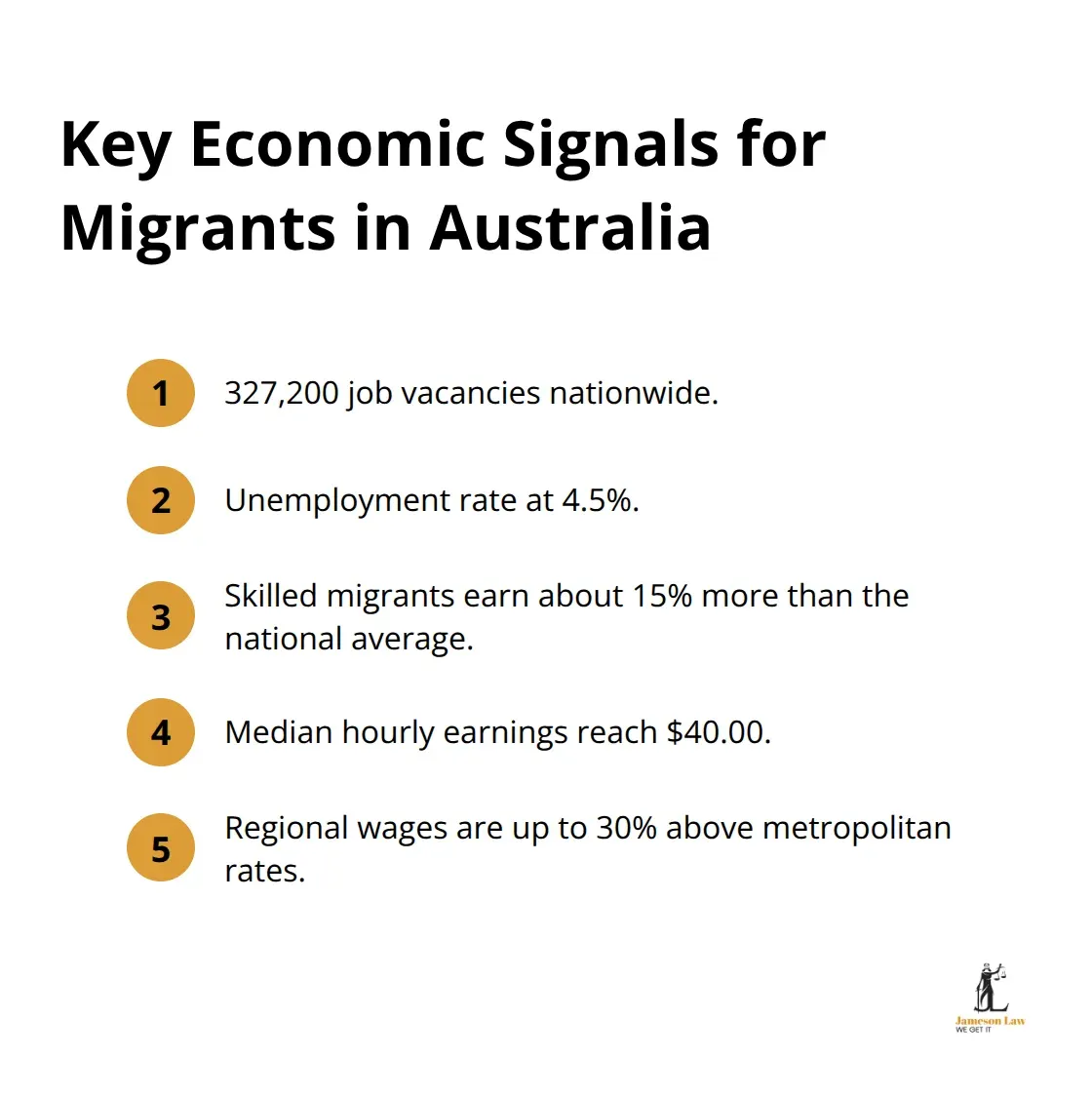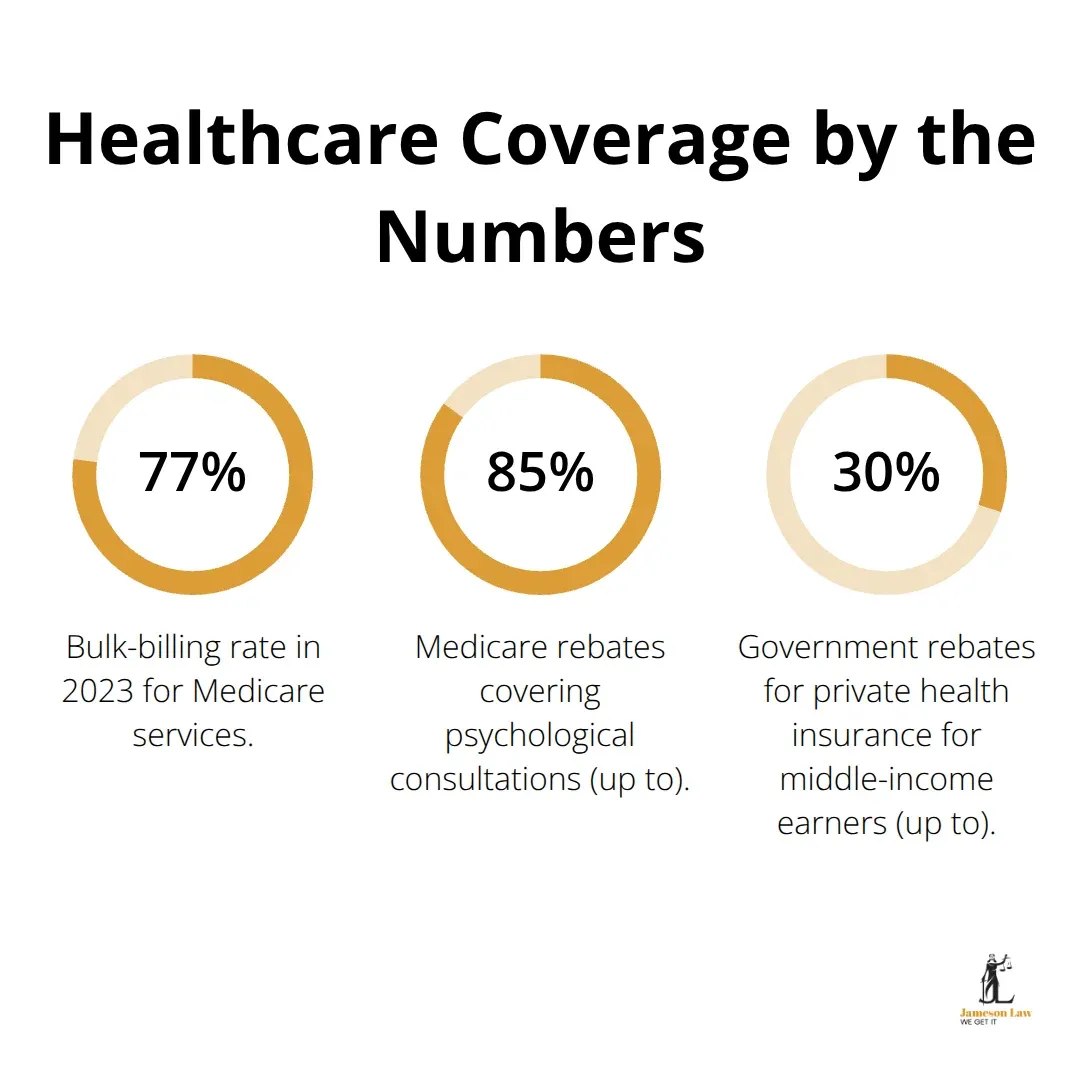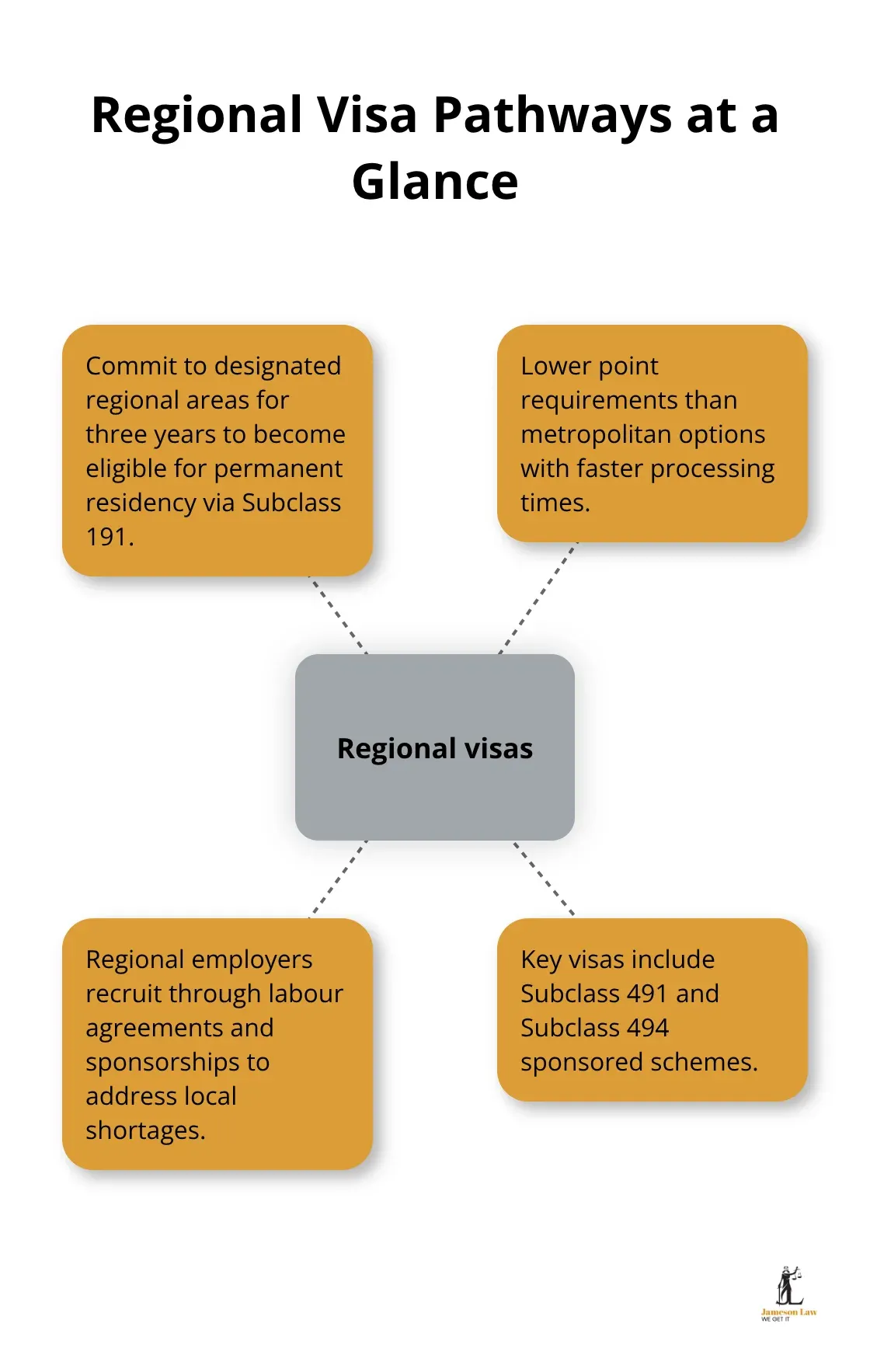Australia consistently ranks among the world’s top migration destinations, attracting over 230,000 new permanent residents annually. The reasons for migration to Australia span from exceptional career prospects to world-class living standards.
We at Jameson Law understand that choosing a new country represents a life-changing decision. This comprehensive guide examines the compelling factors driving global migration to Australia.
Economic Opportunities and Career Advancement
Australia’s economic landscape offers unmatched opportunities for skilled professionals. The Australian Bureau of Statistics reports 327,200 job vacancies nationwide, with healthcare alone accounting for significant positions according to Jobs and Skills Australia. The unemployment rate sits at 4.5%, which reflects remarkable economic stability. Skilled migrants earn approximately 15% more than the national average within their first five years, with median hourly earnings that reach $40.00 as of August 2024 data from the Australian Taxation Office.
Regional Wage Premiums Transform Career Prospects
Western Australia and Queensland deliver wages up to 30% above metropolitan rates, particularly in the construction and resource sectors. The Skills Priority List identifies 286 occupations that face acute shortages, which creates fast-track pathways for qualified professionals. These regional opportunities transform career trajectories while they offer superior work-life balance compared to crowded metropolitan areas.
Migrant Entrepreneurship Flourishes Across Industries
Small business ownership among migrants reaches 23% compared to 18% for Australian-born residents, which demonstrates exceptional entrepreneurial success rates. Migrant-owned businesses contribute significantly to the economy according to the Australian Small Business and Family Enterprise Ombudsman. The regulatory environment supports business formation through streamlined processes and competitive corporate tax rates.
Government Support Accelerates Business Growth
Access to government grants and business development programs specifically targets migrant entrepreneurs. These programs create pathways from employment to business ownership that rarely exist elsewhere. The Australian Government actively invests in infrastructure development, which generates continuous opportunities in engineering and project management fields. This investment creates a stable foundation for long-term career growth and business expansion.

Australia’s economic advantages extend beyond immediate employment opportunities. The country’s commitment to work-life balance and comprehensive social benefits creates an environment where professional success aligns with personal wellbeing. For those considering this move, exploring the benefits of migration provides comprehensive insights into these opportunities.
Quality of Life and Social Benefits
Australia’s Medicare system delivers comprehensive healthcare coverage at zero cost to permanent residents, with bulk-billing rates that decreased to 77% in 2023. The average annual healthcare expenditure per capita stands at $6,031, which produces a life expectancy that ranks fifth globally at 83.2 years. Mental health services receive substantial government funds through Medicare, with rebates that cover up to 85% of psychological consultations. Dental care through the public system serves eligible patients, while private health insurance offers additional benefits with government rebates of up to 30% for middle-income earners.

Education Investment Creates Global Leaders
Public education remains tuition-free for permanent residents, with government expenditure of $13,764 per primary student and $16,203 per secondary student according to the Australian Curriculum Assessment and Reporting Authority. Australia hosts universities that rank among the world’s top 50 in 9 out of 11 subject rankings and in the top 100 across every subject category, with the University of Melbourne and Australian National University among the highest performers worldwide. Vocational education through TAFE institutes provides practical skills with government subsidies that reduce course fees by up to 70% for priority occupations. International students pay full fees, but permanent residents access the same subsidised rates as Australian citizens.
Safety Statistics Prove Australia’s Appeal
Major Australian cities maintain crime rates that research shows are well-managed through comprehensive criminal justice approaches, with Sydney recording lower incident rates compared to many international cities. Road safety measures result in 4.6 deaths per 100,000 people annually (among the world’s safest rates). Natural disaster preparedness includes comprehensive early warning systems and emergency services that respond within average timeframes of 8-12 minutes in metropolitan areas. These safety standards create environments where families thrive without constant security concerns that affect other developed nations.
Climate Diversity Supports Lifestyle Choices
Australia’s diverse climate zones allow residents to choose locations that match their lifestyle preferences and health needs. Major cities experience over 260 sunny days annually, which contributes to improved mental health and supports year-round outdoor activities. The extensive coastline spans over 36,000 kilometres, which makes beach-related activities like swimming and surfing accessible to most residents. This climate advantage supports the outdoor lifestyle that Australians value, with barbecues and sports activities that foster community connections throughout the year.
These comprehensive social benefits form the foundation for Australia’s appeal, but the path to access them requires careful navigation through the country’s immigration system and visa requirements.
Immigration Pathways and Visa Options
Australia’s immigration system processes approximately 70% of permanent visas through the SkillSelect program, which favours younger professionals with higher English proficiency and in-demand skills. The Subclass 189 visa requires invitation scores that currently range from 80-90 points based on occupation demand, with points awarded for age (maximum 30 points for ages 25-32), English ability (maximum 20 points for superior English), and work experience (maximum 20 points for eight years). The Skills Priority List identifies occupations that face acute shortages, which creates fast-track pathways where healthcare professionals like registered nurses consistently receive invitations at lower point thresholds. State nomination through Subclass 190 visas adds five points and expands opportunities for applicants who fall short of federal requirements, with states like South Australia and Tasmania that offer more accessible pathways for specific occupations.
Skilled Migration Demands Strategic Point Accumulation
The point-based system rewards applicants who demonstrate superior English skills through IELTS scores of 8.0 or higher across all bands. Age factors heavily influence success rates, with applicants aged 25-32 who receive maximum points while those over 45 become ineligible for most skilled streams. Educational qualifications add up to 20 points, with Australian degrees that receive additional recognition bonuses of five points. Professional year programs in accounting, engineering, and IT provide extra points while they improve employment prospects through local work experience.
Partner Visas Provide Family Pathway Options
Partner visas process 47,000 applications annually through two-stage assessment that begins with temporary status before permanent residency approval. The Department of Home Affairs requires genuine relationship evidence that spans 12 months minimum, which includes joint financial commitments, shared arrangements, and social recognition documentation. Processing times currently extend 29-38 months for offshore applications and 20-29 months for onshore applications, which makes early preparation essential for successful outcomes. Relationship evidence must demonstrate commitment through bank statements, lease agreements, and statutory declarations from family and friends.
Business Investment Demands Substantial Commitment
Business and investment visas target high-net-worth individuals through programs that require minimum investments from $1.25 million to $15 million based on the stream. The Business Innovation and Investment Program processes 5,000 visas annually, with success rates that vary significantly based on business experience and investment capacity. Investor stream applicants must demonstrate three years of successful business ownership with annual turnover that exceeds $750,000, while the significant investor stream requires $5 million in investments maintained for four years before permanent residency eligibility.
Regional Visas Offer Alternative Pathways
Regional sponsored migration schemes provide additional opportunities through Subclass 491 and 494 visas that require three-year commitments to designated areas. These pathways offer lower point requirements and faster processing times compared to metropolitan options. Regional employers actively recruit overseas workers through labour agreements and sponsor arrangements that address local skill shortages. After three years of regional residence and work, visa holders become eligible to apply for permanent residency through Subclass 191 visas.

Final Thoughts
The reasons for migration to Australia become clear when you examine the country’s exceptional combination of economic opportunities, social benefits, and lifestyle advantages. Australia offers 327,200 job vacancies nationwide while skilled migrants earn 15% above national averages, which transforms professional trajectories. The Medicare system provides comprehensive healthcare coverage while world-class universities rank among the global top 50, creating an environment where families thrive across generations.
Australia’s immigration pathways accommodate diverse circumstances through skilled migration programs, family reunion options, and business investment streams. However, complex visa requirements demand professional expertise to maximise approval chances and avoid costly delays. The point-based system rewards strategic preparation, while processing times (that extend up to 38 months) require early planning and meticulous documentation.
We at Jameson Law provide expert immigration guidance for Australian visa applications. Our team understands the intricacies of each pathway and works to achieve optimal outcomes for prospective migrants. Professional legal support often determines the difference between successful migration and prolonged uncertainty.













